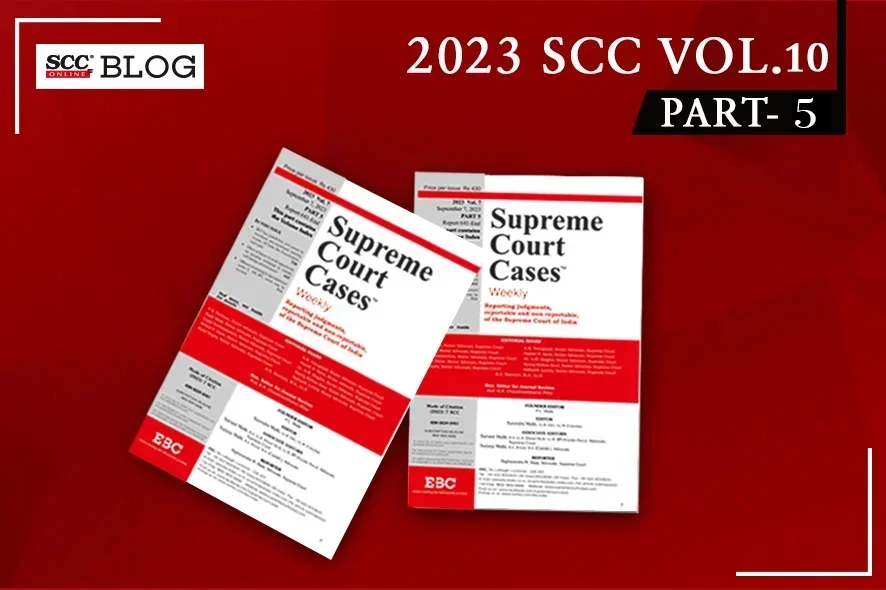Civil Procedure Code, 1908 — S. 11 — Res judicata: Only determinations which are essential or fundamental to the substantive decision, and not collateral thereto, held, would result in application of doctrine of res judicata. Scope of applicability of doctrine of res judicata and effective test to distinguish between a fundamental or collateral determination, explained. [Yadaiah v. State of Telangana, (2023) 10 SCC 755]
Government Grants, Largesse, Public Property and Public Premises — Entitlement/Eligibility criteria — Allotment of land: Claim for allotment of land, based on inter-departmental communication and not on a letter of allotment, cannot be sustained as merely departmental communication does not create any right. [Mahadeo v. Sovan Devi, (2023) 10 SCC 807]
Insolvency and Bankruptcy Code, 2016 — Ss. 30, 31, 12, 13 and 15: Claim post approval of resolution plan by CoC, as in the present case contingent claim arising from arbitral award for which proceedings under S. 37 of the Arbitration Act were still pending is not entertainable. [RPS Infrastructure Ltd. v. Mukul Kumar, (2023) 10 SCC 718]
Negotiable Instruments Act, 1881 — Ss. 141(1) and 141(2) and S. 138 — Offence of dishonour of cheque by a company/partnership firm: Distinguishing S. 141(1) from S. 141(2), held, by virtue of S. 141(1), the guilt for the offence and the liability to be prosecuted and punished shall be extended to every person who, at the time the offence was committed, was in charge of and was responsible to the company for the conduct of its business: irrespective of whether such person is a Director, manager, secretary or other officer of the company. Law clarified on prosecution for offence of dishonour of cheque, when different persons in- charge/responsible of the company at different times. [S.P. Mani & Mohan Dairy v. Snehalatha Elangovan, (2023) 10 SCC 685]
Penal Code, 1860 — Ss. 302/34 and 341 — Common intention to murder — Determination of: Matters to be considered for determination of common intention to murder, illustrated. [Bhaktu Gorain v. State of W.B., (2023) 10 SCC 749]
Registration Act, 1908 — S. 49 proviso and Ss. 17(1-A) — Relative scope and combined effect: S. 17(1-A) is an exception to operation of S. 49 proviso. Otherwise, S. 49 proviso shall be applicable with respect to the documents other than those referred to in S. 17(1-A). Thus, unregistered documents affecting immovable property and required by the Registration Act or the Transfer of Property Act, 1882 to be registered, may be received as evidence of a contract in a suit for specific performance, or as evidence of any collateral transaction not required to be effected by registered instrument, however, subject to S. 17(1-A). [R. Hemalatha v. Kashthuri, (2023) 10 SCC 725]
Service Law — Departmental Enquiry — Criminal proceedings: Effect of acquittal in criminal proceedings on disciplinary proceedings initiated for alleged embezzlement, explained. [SBI v. P. Zadenga, (2023) 10 SCC 675]
Supreme Court Rules, 2013 — Or. XL Rr. 3, 5, 6 and Or. XLVII — Application for “clarification”, “modification” or “recall” — Maintainability: Filing of applications styled as “miscellaneous applications” or “applications for clarification/modification” in guise of a review, held, cannot be countenanced. [Supertech Ltd. v. Emerald Court Owner Resident Welfare Assn., (2023) 10 SCC 817]
Urban Land (Ceiling and Regulation) Act, 1976 — S. 2(q) — “Vacant land” — Construction, meaning and import of: Conflicting view taken in L.J. Johnson, (1983) 4 SCC 110 and B.E. Billimoria, (2003) 7 SCC 336 on interpretation of “vacant land”, matter referred to larger Bench. [Kewal Court (P) Ltd. v. State of W.B., (2023) 10 SCC 734]






